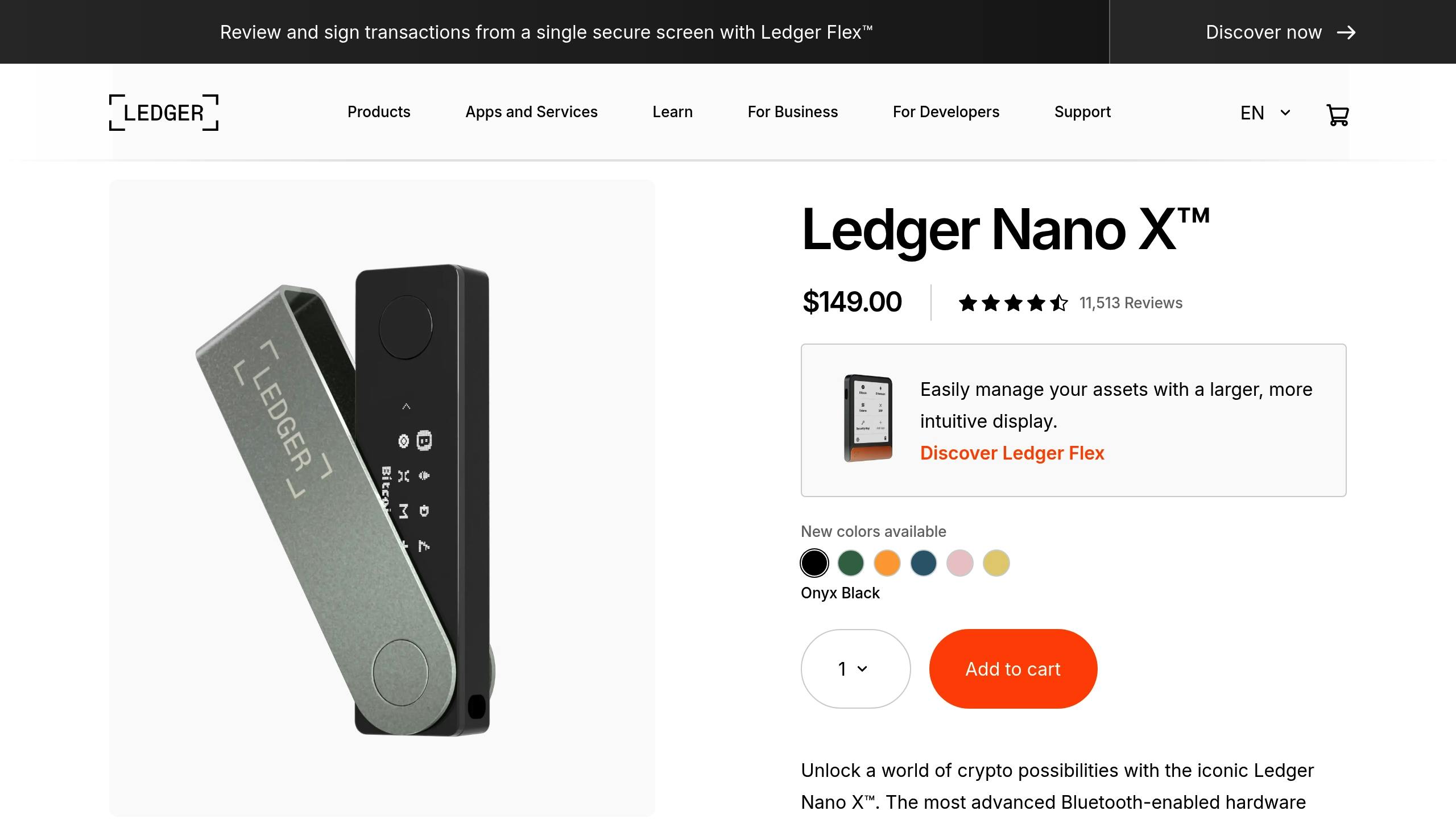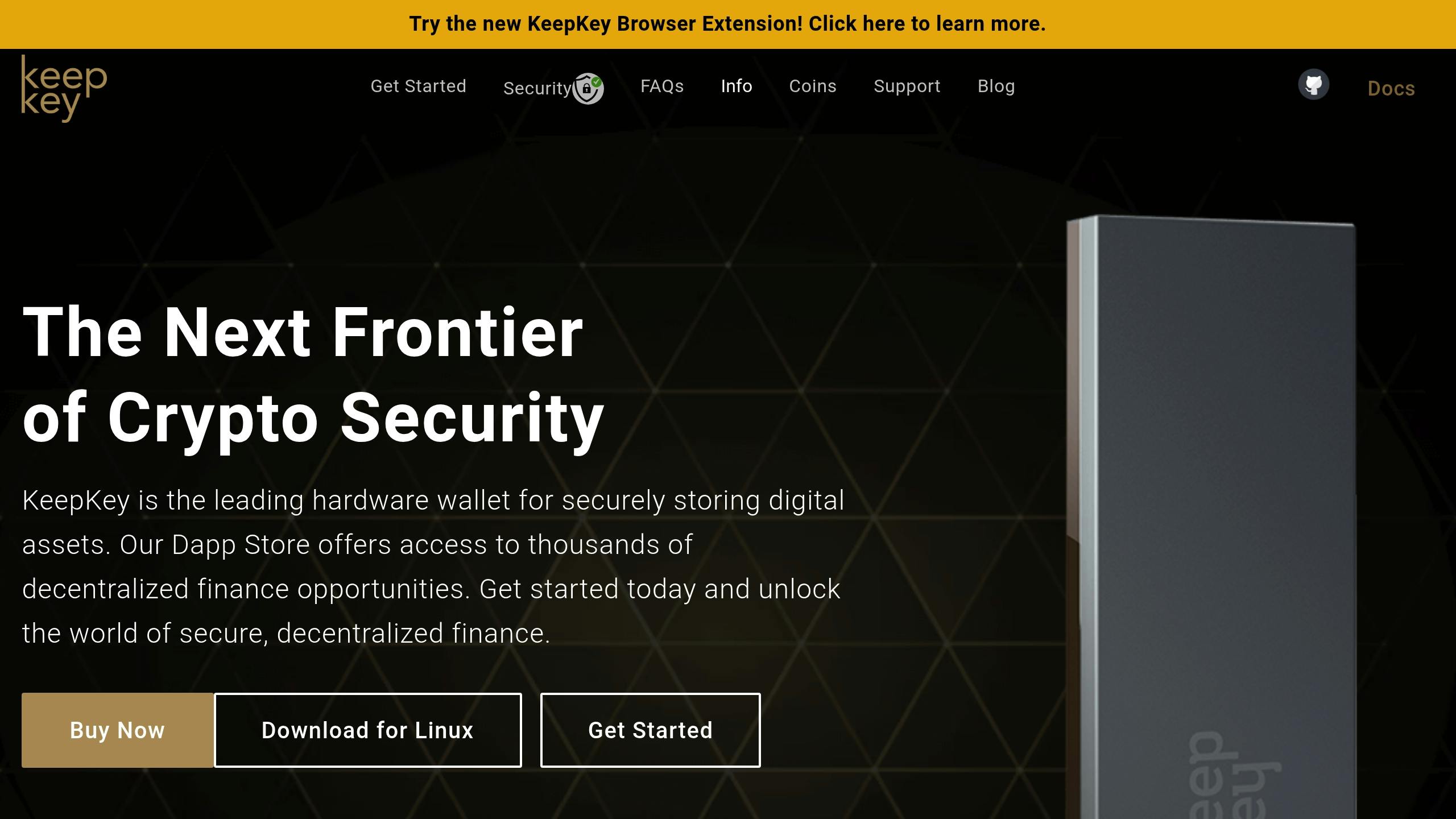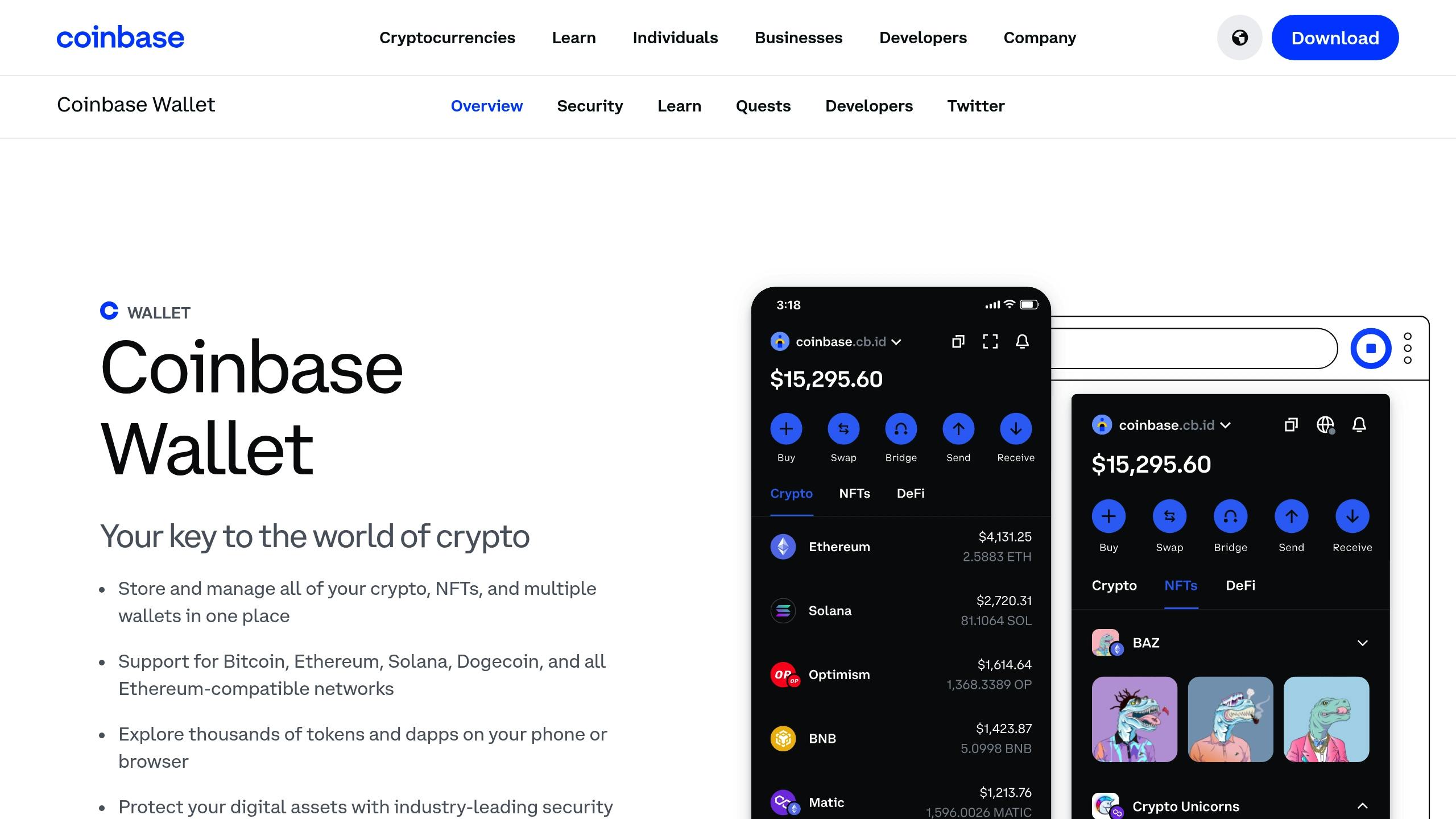Best Bitcoin Wallets
Explore various Bitcoin wallets, their security features, and how to choose the right one for your needs in this comprehensive guide.

Looking for the best Bitcoin wallets? Here’s what you need to know:
Key Takeaways:
-
Types of Wallets:
- Hot Wallets (e.g., mobile, desktop, web): Convenient but less secure.
- Cold Wallets (e.g., hardware wallets): Highly secure for long-term storage.
- Custodial vs. Non-Custodial: Custodial wallets manage your keys; non-custodial wallets give you full control.
-
Top Wallets Reviewed:
- Ledger Nano X: Secure hardware wallet with Bluetooth and support for 5,000+ assets.
- Trezor Model T: Open-source hardware wallet with touchscreen and strong encryption.
- KeepKey: Budget-friendly hardware wallet with wide crypto support.
- Electrum: Bitcoin-only software wallet with advanced security features.
- Exodus: User-friendly software wallet with built-in exchange.
- BlueWallet: Mobile wallet with advanced Bitcoin tools like Lightning Network.
- Coinbase Wallet: Self-custody wallet with multi-chain support.
- MetaMask: Ethereum-focused wallet adding Bitcoin support in 2025.
- Trust Wallet: Mobile wallet for 10M+ assets with strong encryption.
-
How to Choose:
- Security: Look for encryption, PINs, and multi-signature features.
- Ease of Use: Beginners may prefer wallets like Coinbase or Exodus.
- Compatibility: Ensure the wallet works on your preferred device.
- Cost: Hardware wallets range from $49 to $149, while software wallets are often free.
Quick Comparison:
| Wallet | Type | Security Level | Supported Assets | Cost | Best For |
|---|---|---|---|---|---|
| Ledger Nano X | Hardware | High | 5,000+ | $149 | Long-term storage |
| Trezor Model T | Hardware | High | 1,000+ | $129 | Advanced security |
| KeepKey | Hardware | High | 7,000+ | $59 | Budget-friendly |
| Electrum | Software | Medium-High | Bitcoin only | Free | Bitcoin enthusiasts |
| Exodus | Software | Medium | 260+ | Free | Beginners |
| BlueWallet | Mobile | Medium | Bitcoin only | Free | Advanced Bitcoin users |
| Coinbase Wallet | Software | Medium | 5,500+ | Free | Multi-chain users |
| MetaMask | Software | Medium | Ethereum & Bitcoin* | Free | Ethereum & Bitcoin users |
| Trust Wallet | Mobile | Medium | 10M+ | Free | Mobile-first users |
Tips for Security:
- Use hardware wallets for large amounts.
- Regularly update wallet software.
- Enable two-factor authentication where available.
- Store recovery phrases offline in secure locations.
This guide will help you pick the right wallet based on your needs. Keep reading for detailed reviews of each wallet.
Crypto Wallets Explained: A Complete Beginner’s Guide
Types of Bitcoin Wallets
Bitcoin wallets come in different forms, each offering a mix of security and ease of use. Here’s a breakdown of the main types and what they’re best suited for:
Hardware Wallets (Cold Storage)
Hardware wallets keep your private keys offline, making them one of the safest options available. These devices store keys in a secure chip, completely disconnected from the internet, significantly reducing hacking risks. For example, Ledger, a leading manufacturer, has sold over 7 million devices, showing how popular these wallets have become.
If you’re holding a large amount of Bitcoin for the long term and prioritize security, a hardware wallet is a solid choice.
Software Wallets (Hot Storage)
Software wallets are designed to run on your computer or smartphone, making them convenient for everyday use. However, since they’re connected to the internet, they are more vulnerable to attacks.
Desktop wallets strike a balance between security and usability. They are generally safer than mobile wallets but less convenient for on-the-go access. Examples include Exodus and Sparrow.
Mobile Wallets
Mobile wallets are apps you can install on your smartphone, offering the highest convenience for daily transactions. However, they come with risks like theft or malware attacks.
Web Wallets
Web wallets operate through your browser, letting you access your Bitcoin from any device with an internet connection. While they are extremely convenient, they offer the lowest level of security compared to other wallet types.
| Wallet Type | Security Level | Convenience | Best For | Typical Cost |
|---|---|---|---|---|
| Hardware | High | Low | Long-term storage | $49.99 – $399 |
| Software | Medium | High | Regular trading | Free |
| Mobile | Medium-Low | Highest | Daily transactions | Free |
| Web | Low | High | Small amounts | Free |
Custodial vs. Non-Custodial Wallets
Another important factor is whether the wallet is custodial or non-custodial. Custodial wallets, often provided by exchanges, hold your private keys for you. Non-custodial wallets, on the other hand, give you full control over your keys, which enhances security but also makes you fully responsible for their safety.
A 2023 study highlighted that wallets on outdated operating systems, particularly Android, are at risk of attacks. Common issues include weak passwords, vulnerabilities to brute-force attacks, and unencrypted key storage.
Balancing Security and Convenience
Many users choose a hybrid approach for managing their Bitcoin. For example, they might use a hardware wallet to securely store larger amounts over the long term while keeping smaller amounts in a hot wallet for daily use. This method combines the strong security of cold storage with the ease of access offered by hot wallets.
1. Ledger Nano X

The Ledger Nano X is a top-tier hardware wallet designed to offer strong security paired with user-friendly features. Priced at $149, it builds on the advantages of hardware wallets discussed earlier.
Security Architecture
This wallet uses a "Secure Element" chip certified by France’s National Agency for the Security of Information Systems (ANSSI). This chip encrypts and isolates your private keys, making them highly secure against unauthorized access. It operates on BOLOS, a custom-built operating system focused on security.
Physical Specifications and Design
The Nano X measures 2.83 x 0.73 x 0.46 inches and weighs just 1.2 ounces. It features a larger screen and an improved button layout, making it more user-friendly than earlier models. Its 100mAh lithium-ion battery provides up to 5 hours of active use and can last several days on standby.
Key Features and Capabilities
| Feature | Specification | Benefit |
|---|---|---|
| Cryptocurrency Support | 5,000+ coins/tokens | Manage a wide range of assets |
| Mobile Compatibility | iOS and Android | Easy access on the go |
| Battery Life | Several days per charge | Long-lasting portability |
| Security PIN | 4–8 digits | Customizable protection |
| Connection Options | USB-C and Bluetooth | Flexible connectivity |
Mobile Integration
The Ledger Live app pairs seamlessly with the Nano X, offering smooth mobile integration. It has earned high ratings – 4.9/5 on the Apple Store and 4.6/5 on Google Play. The wallet’s Bluetooth feature ensures secure mobile transactions.
Security Considerations
The Nano X includes several key security measures:
- Allows only three PIN attempts before private keys are automatically erased.
- Regular firmware updates through the Ledger Live app.
- Ongoing security testing by Ledger’s in-house "donjon" team.
- A bug bounty program to identify and address vulnerabilities.
Investment Protection
For Bitcoin traders managing large portfolios, the Nano X offers excellent protection and ease of use. Its expanded storage reduces the need for frequent app management, while the improved screen and controls make navigation simpler.
2. Trezor Model T

The Trezor Model T is a high-end hardware wallet featuring a touchscreen interface and a strong focus on transparent security.
Security Architecture
The Model T is designed with multiple security layers to protect your Bitcoin. It follows a zero-trust model, requiring on-device confirmation for every transaction. Key security features include:
| Security Feature | Function | Purpose |
|---|---|---|
| PIN Protection | 1–9 digit PIN | Blocks unauthorized access |
| Memory Wipe | Activates after 16 failed attempts | Guards against brute force attacks |
| Bootloader Verification | Confirms firmware authenticity | Stops malicious software installations |
| BIP39 Passphrase | Adds an extra encryption layer | Protects against physical theft |
Hardware Specifications
The Model T comes with a 1.54-inch color touchscreen (240 x 240 pixels). It measures 2.52 x 1.54 x 0.39 inches and weighs just 0.77 ounces – making it compact and easy to use.
Key Features
- Open-source Design: Both hardware and software are completely transparent and open for verification.
- Cryptocurrency Support: Works with over 1,000 coins and tokens.
- Advanced Backup: Supports Shamir Backup (SLIP39) for extra security.
- USB Connectivity: Connects only via USB to reduce exposure to online threats.
The Model T balances advanced protection with ease of use, much like other high-quality hardware wallets.
Physical Security
A holographic tamper-evident sticker seals the USB port, letting you confirm the device’s integrity before use. Additionally, it meets CE and RoHS certifications, ensuring high quality and reliability.
User Experience
"The touchscreen and input are very well-thought-out experiences on Trezor Model T – you can use it without any discomfort." – Vault12
The touchscreen interface makes managing Bitcoin straightforward while maintaining security. Every transaction requires on-device approval, allowing you to review details before proceeding. This setup ensures both simplicity and safety.
Security Considerations
While it lacks a Secure Element chip, the Model T leverages an open-source framework and the BIP39 passphrase for protection. This open approach allows regular community scrutiny and validation of its security mechanisms.
Investment Value
The Trezor Model T combines high-level security with an intuitive design, making its premium price worthwhile. Regular updates and Trezor’s reputation in cryptocurrency security further enhance its value.
3. KeepKey

KeepKey stands out as a hardware wallet that balances security with ease of use. Introduced in 2014 in response to major security breaches, it continues to adapt to meet user expectations.
Hardware Design
KeepKey boasts a lightweight design crafted from anodized aluminum, weighing just 1.9 ounces (54g) [29, 30]. Its large display makes it simple to review and confirm transaction details.
Security Features
| Feature | Description | Benefit |
|---|---|---|
| Offline Storage | Private keys stored offline | Shields against online attacks |
| PIN Protection | Randomized PIN pad | Defends against keyloggers |
| Recovery System | 12-word recovery phrase | Provides a secure backup |
| Open Source | Fully open-source firmware | Enables community scrutiny |
| Passphrase | Optional extra encryption | Adds another security layer |
Asset Support
KeepKey supports more than 7,000 cryptocurrencies across 348 blockchains, outpacing both Ledger Nano X (5,500+ assets) and Trezor Model T (1,000+ assets) [30, 31].
Integration Features
The wallet integrates directly with ShapeShift, allowing users to exchange cryptocurrencies quickly, explore decentralized finance options, adjust transaction speeds, and create unlimited wallet addresses.
User Experience
"Amazing support team. You never realize how important support is until you actually need support! KeepKey – your team is A+++" – Dalton Bryan
Transactions require manual confirmation via a built-in button, offering an extra layer of security while keeping things user-friendly.
Platform Compatibility
KeepKey works seamlessly with Windows, macOS, and Linux.
Investment Value
Priced at $59, KeepKey delivers solid value compared to its competitors. While it doesn’t include high-end features like Bluetooth connectivity, it offers strong security and wide cryptocurrency support at a budget-friendly price.
Security Best Practices
For optimal security with KeepKey, always purchase from the official website to avoid tampered devices. Store your recovery phrase in a fireproof safe, keep the wallet offline when not in use, update the firmware regularly, and use a strong PIN code [34, 35]. These steps ensure your funds remain secure, making KeepKey a reliable choice in the hardware wallet space.
4. Electrum

Launched in 2011, Electrum is a Bitcoin-only wallet widely appreciated by experienced users for its strong security features and customization options. Its exclusive focus on Bitcoin makes it stand out from the multi-asset wallets discussed earlier.
Core Features
| Feature | Description | Advantage |
|---|---|---|
| Lightweight Client | No need to download the blockchain | Quick setup; saves storage space |
| Server Protocol | Client-server architecture | Fast transaction verification |
| Multi-signature Support | Split spending permissions | Greater control over security |
| Hardware Integration | Works with Ledger, Trezor, KeepKey | Cold storage compatibility |
| Two-factor Authentication | Extra security layer | Better account protection |
Security Architecture
Electrum’s security measures are designed to keep private keys encrypted and confined to the user’s device. It uses deterministic key generation, which ensures users can fully control their funds while maintaining reliable backup options.
Advanced Tools for Experienced Users
Electrum provides additional tools tailored for advanced users:
- Customizable server settings to reduce downtime
- Adjustable transaction fees
- Support for Bitcoin and signed URIs
- Integration with VPN and Tor for enhanced privacy
- Lightweight verification (SPV) for faster transaction validation
Performance Metrics
Electrum scores 7.9 overall, thanks to its focus on security and Bitcoin-specific capabilities.
"Electrum’s focus is speed, with low resource usage and simplifying Bitcoin. Startup times are instant because it operates in conjunction with high-performance servers that handle the most complicated parts of the Bitcoin system." – Electrum FAQ
Platform Compatibility
Electrum supports Windows, macOS, Linux, and Android, ensuring it’s accessible on all major platforms while retaining its security benefits.
Who Should Use Electrum?
Electrum is particularly suited for users managing large Bitcoin holdings. It’s free to use, but its technical interface and advanced features are better suited for those who value security and customization over ease of use. Pairing it with the Electrum Personal Server further enhances its performance.
Tips for Maximizing Security
To ensure optimal security when using Electrum:
- Verify GPG signatures of downloaded files
- Enable two-factor authentication
- Use cold storage for added protection
- Set up multi-signature wallets for larger holdings
- Stick to official servers for transaction verification
Electrum’s Bitcoin-focused design and high-security standards make it a strong choice for advanced users. However, its technical interface might be daunting for beginners.
sbb-itb-dd9e24a
5. Exodus

Exodus is a software wallet designed to strike a balance between ease of use and security. With a user-friendly interface and solid protection mechanisms, it’s highly rated – 4.6/5 on the Apple Store and 4.2/5 on Google Play.
Security Architecture
Exodus follows a non-custodial model, meaning users retain full control of their private keys. Its security framework includes:
| Security Feature | Purpose | How It Works |
|---|---|---|
| Encryption Protocol | Protects user assets | Built-in encryption |
| Auto-lock | Secures wallet after idle | Automatic timeout feature |
| Recovery Seed | Backup access | 12-word phrase system |
| Trezor Integration | Adds extra protection | Compatible with hardware wallets |
User Experience Design
Exodus stands out for its clean and intuitive interface, making cryptocurrency management straightforward for all types of users. Unlike more technical wallets, it focuses on simplicity without sacrificing critical security features.
Key Features
Exodus offers a range of tools for managing cryptocurrencies:
| Feature | Description | Benefit |
|---|---|---|
| Portfolio View | Displays all holdings | Easy monitoring of assets |
| Built-in Exchange | Enables direct trading | Quick asset conversion |
| Multi-Asset Support | Supports over 260 cryptocurrencies | Broad investment choices |
| 24/7 Support | Round-the-clock help | Assistance when needed |
Security Considerations
Although Exodus provides strong security, there are a few key points to keep in mind:
- It’s a hot wallet, meaning it stays connected to the internet.
- Two-factor authentication isn’t available.
- The wallet’s security depends heavily on the security of your device.
"Exodus doesn’t have access to your private keys; therefore we can’t gain access to your crypto." – Exodus
Tips for Staying Secure
To protect your funds while using Exodus:
- Keep your antivirus software updated.
- Only download the wallet from the official website, exodus.com.
- Store smaller, everyday-use funds in Exodus and keep larger amounts offline.
Recent Security Alerts
In January 2024, Kaspersky reported a malware attack targeting MacOS users and their Exodus wallets. This incident highlights the importance of maintaining secure devices.
Who Should Use Exodus?
Exodus is a great choice for users who prioritize:
- A straightforward, visually appealing interface
- Support for a wide range of cryptocurrencies
- Regular updates to improve security
- Compatibility with hardware wallets
- Built-in trading tools
Its combination of usability and security makes it suitable for both beginners and seasoned cryptocurrency enthusiasts.
6. BlueWallet

BlueWallet is a mobile-focused Bitcoin wallet that combines ease of use with advanced tools. It holds a 4.4/5 rating on the Apple App Store and 3.9/5 on Google Play. It’s also recognized as the first Bitcoin-only wallet for iOS to offer fee control.
Security Features
BlueWallet employs several layers of protection to safeguard user funds:
| Security Feature | Function | Benefit |
|---|---|---|
| Multi-signature Vaults | Requires multiple keys for transactions | Adds extra protection for cold storage |
| Plausible Deniability | Creates a decoy wallet with a separate password | Protects against forced disclosures |
| Encrypted Storage | Allows multiple encrypted wallets | Enhances compartmentalized security |
| Address Generation | Generates a new address for each transaction | Improves privacy |
Advanced Tools
Despite its simplicity, BlueWallet offers a range of high-level features:
| Feature | Description | User Benefit |
|---|---|---|
| Lightning Network | Built-in support | Enables fast, low-cost transactions |
| Bech32 Support | Native Segwit transactions | Reduces fees by up to 40% |
| Fee Control | Customizable transaction fees | Helps manage costs effectively |
| Multiple Wallet Support | Create or import multiple wallets | Allows flexible fund management |
These features are designed to cater to both beginners and seasoned Bitcoin users.
User Experience
BlueWallet is designed to be easy to use while still offering advanced capabilities. Creating a wallet takes just four clicks, making it beginner-friendly, yet it doesn’t shy away from offering tools for experienced users.
Tips for Securing Your Wallet
To keep your funds safe, consider these best practices:
- Enable all available security features.
- Store your seed backup and passphrase in separate, secure locations.
- Only keep funds on your mobile wallet that you’re comfortable risking.
- Use multisignature vaults for larger amounts.
"The BlueWallet is one of the best mobile wallets for users who want to store their bitcoin while having quick access to their funds." – Deniz Saat, Author at CoinBeast
Technical Capabilities
BlueWallet supports a range of advanced Bitcoin functionalities:
- Over 30 currencies and languages
- Connection to personal Bitcoin nodes
- Replace-by-fee (RBF) and Child-pays-for-parent (CPFP) transactions
- PSBT (Partially Signed Bitcoin Transactions)
Its open-source nature ensures transparency, allowing independent verification of its code.
Drawbacks
While BlueWallet is powerful, it does have some limitations:
- Bitcoin-only support
- No built-in options to buy or sell Bitcoin
- Available only as a mobile app
7. Coinbase Wallet

Coinbase Wallet is a self-custody wallet that gives you complete control over your Bitcoin and other digital assets. With impressive ratings of 4.7/5 on the Apple App Store and 4.6/5 on Google Play, it provides a user-friendly way to manage cryptocurrencies.
Security Architecture
Coinbase Wallet uses multiple layers of protection to ensure your assets remain safe:
| Security Feature | Description | User Benefit |
|---|---|---|
| Self-Custody Model | You control your private keys | No third-party access to funds |
| Biometric Authentication | Supports fingerprint and Face ID | Fast and secure access |
| Hardware Integration | Works with Ledger devices | Better cold storage options |
| DApp Blocklist | Blocks access to harmful apps | Reduces scam risks |
| Token Approval Alerts | Shows transaction details upfront | Prevents unauthorized transfers |
This layered approach ensures strong protection while maintaining usability.
Advanced Capabilities
Coinbase Wallet combines security with a range of features:
| Feature | Benefit | Limitation |
|---|---|---|
| Multi-Chain Support | Supports Bitcoin and 5,500+ assets | Limited NFT functionality |
| Bank Integration | Buy crypto in 130+ countries | Transaction fees apply |
| Multiple Address Sets | Organize assets separately | Only for Ethereum/Solana |
| Review DApp Connections | Manage and revoke app connections | – |
These features make it easier to manage a variety of assets while keeping your transactions secure.
Transaction Management
Coinbase Wallet provides clear oversight of all transactions. It charges up to 1% for token swaps, and additional network fees apply for Bitcoin transactions. This balance of advanced features and secure processes makes it a reliable choice for crypto users.
Integration Benefits
"Coinbase Wallet is a self-custody web3 wallet, putting you in full control of the private keys to your assets on the blockchain. Nobody, including Coinbase, can access your tokens or NFTs without your recovery phrase." – Coinbase
The wallet works independently of a Coinbase.com account, though it can integrate with the exchange for added convenience.
Security Best Practices
To keep your assets secure, follow these tips:
- Enable biometric security features.
- Use strong passwords and activate two-factor authentication (2FA).
- Store your recovery phrase in multiple secure locations.
- Double-check wallet addresses before making transactions.
- Regularly review connected DApps.
These steps help minimize risks and protect your funds.
Performance Considerations
While Coinbase Wallet scores an 8.4 in comparative reviews, it does have some limitations. It lacks direct customer support, and its security, while strong, doesn’t quite match the level of hardware wallets like the Ledger Nano X.
8. MetaMask

MetaMask, widely recognized as an Ethereum wallet, is set to expand its functionality by adding native Bitcoin support. Scheduled for release in Q3 2025, this update will let users store, send, and receive Bitcoin directly, without needing wrapped tokens or third-party tools. This marks a step forward in MetaMask’s role as a secure, multi-chain asset manager.
Security Considerations
With new features come added risks. As an internet-connected hot wallet, MetaMask is naturally exposed to security threats. Taylor Monahan from MetaMask highlights the importance of user awareness:
"Whenever there’s a large hack, people are very quick to look at the specific product … but in general, especially with Lazarus, it really doesn’t matter. You can use any wallet… When they get that initial access to the human’s device, they’ll just sit and watch you, and first understand your operations and what you’re doing. There’s not a single product out there that will perfectly save you… and they’re going to come up with a very customized plan that they’ve tailored to you."
Tips for Better Security
To protect your Bitcoin assets while using MetaMask, follow these steps:
- Use strong, unique passwords and enable biometric login if available.
- Double-check transaction details like addresses and amounts before confirming.
- Regularly review and revoke unnecessary permissions for dApps.
- Always download MetaMask from official sources.
- Pair MetaMask with a hardware wallet for an extra layer of security.
Technical Performance
MetaMask’s updated system for smart transactions boasts a 99.995% success rate by minimizing failed transactions and reducing risks like front-running. The redesigned interface also simplifies navigation and improves transaction clarity.
Current Limitations
It’s important to recognize that Bitcoin and Ethereum operate on separate networks. Until native Bitcoin support is fully implemented, sending BTC to an Ethereum address could result in permanent loss of funds. At this time, trading Bitcoin on Ethereum-compatible chains requires wrapped tokens, which come with added custodial and smart contract risks.
Future Enhancements
To address these limitations, MetaMask is introducing a Multichain API. This feature will enable smooth interactions between Ethereum, Solana, and Bitcoin networks, removing the need for manual network switching. Additionally, the gas fee abstraction system will allow users to manage transaction fees using a variety of tokens, offering greater flexibility.
9. Trust Wallet

Trust Wallet is a popular non-custodial mobile Bitcoin wallet, trusted by over 140 million users worldwide. It gives users complete control of their private keys and emphasizes security and privacy at its core.
Security Architecture
Trust Wallet employs AES encryption to keep private keys safe on users’ devices. Regular security audits by firms like CertiK ensure its defenses remain up to date. However, unlike some competitors, it does not offer two-factor authentication.
One of its standout features is a risk detection system that warns users about potentially unsafe transactions before they are executed. Trust Wallet’s team highlights their commitment to security:
"Security & privacy are at the core of what we do. Your keys, your crypto. We never access or store your private keys."
User Experience and Features
Trust Wallet combines its security measures with a simple, intuitive interface. It has earned high ratings across major platforms:
| Platform | Rating | Number of Reviews |
|---|---|---|
| Apple App Store | 4.7/5 | 190,000+ |
| Google Play Store | 4.6/5 | 1.3 million+ |
The wallet supports over 10 million assets across 100+ blockchains and includes a browser extension compatible with Chrome, Brave, Opera, and Edge.
Tips for Better Security
To ensure optimal security, always download the app from official sources, keep your recovery phrase stored offline, verify communications through Trust Wallet’s official website, and consider using a hardware wallet for cold storage.
Performance and Reliability
Since its launch in 2017, Trust Wallet has built a reputation for reliability. For those looking for added security, it can be integrated with Ledger hardware wallets, offering extra protection for Bitcoin storage.
Despite its high ratings on app stores, user feedback on TrustPilot paints a different picture, with an average score of 1.2/5 and 93% of reviewers giving the lowest rating. While the app is widely praised, these mixed reviews highlight the importance of considering personal risk preferences when choosing a wallet. Trust Wallet remains a strong contender among Bitcoin wallets, though its performance may not meet everyone’s expectations.
Feature Comparison
Here’s a quick look at how Bitcoin wallets stack up in terms of security, platform compatibility, and integration. We’ll also touch on recent security incidents to provide a complete picture.
Security Features
Ledger Nano X vs. Trezor Model T: Security at a Glance
| Feature | Ledger Nano X | Trezor Model T |
|---|---|---|
| Security Technology | Secure Element | Zero-trust & open-source |
| Certification | ANSSI certified | – |
| PIN Protection | Standard PIN protection | Memory wiped after 16 failed attempts |
| Backup Options | 24-word recovery seed | BIP39 passphrase |
Both wallets offer strong security, but their approaches differ. Ledger relies on a proprietary secure element, while Trezor emphasizes transparency with its open-source model.
Platform Compatibility and User Interface
Wallets vary widely in their platform support and ease of use. Some, like Exodus and Coinbase Wallet, are versatile, working across desktop, mobile, and browser platforms. Others, such as Electrum, are more specialized.
| Wallet | Desktop | Mobile | Browser Extension | Beginner-Friendly |
|---|---|---|---|---|
| Exodus | Yes | Yes | Yes | High |
| Coinbase Wallet | Yes | Yes | Yes | High |
| Electrum | Yes | No | No | Low |
| MetaMask | No | Yes | Yes | Medium |
| Trust Wallet | No | Yes | No | High |
If you’re new to crypto, wallets like Exodus, Coinbase Wallet, and Trust Wallet are easier to navigate. Electrum, while powerful, is better suited for advanced users.
Recent Security Considerations
Security remains a critical factor. On December 14, 2023, Ledger faced a phishing attack targeting its Ledger Connect Kit. The issue was resolved within five hours, but it highlighted the need for constant vigilance. Such incidents underline the importance of choosing wallets with strong protection measures.
Integration Capabilities
Integration with external services can elevate a wallet’s functionality. For instance, Coinbase Wallet makes accessing decentralized finance (DeFi) apps simple. Meanwhile, Exodus stands out for its broad platform support and intuitive interface, catering to both beginners and experienced users.
Recommendations
Here’s how to choose the right cryptocurrency wallet based on your experience level and needs.
For Beginners
If you’re new to cryptocurrency, Coinbase Wallet is a fantastic starting point. It supports over 5,500 cryptocurrencies, is free to use, offers regular security updates, and works perfectly within the Coinbase ecosystem.
"We chose the Coinbase wallet as the best wallet for beginners who want to conveniently store and access their cryptocurrency."
Another great option for beginners is Exodus, known for its easy-to-use interface and hassle-free setup process.
For Users with Large Holdings
If you’re managing a substantial amount of cryptocurrency, prioritizing security with cold storage solutions is crucial. Some of the top hardware wallets include:
| Wallet | Price | Key Security Feature |
|---|---|---|
| Trezor Model T | $129 | Open-source software |
| Ledger Nano X | $149 | Bluetooth and USB connectivity |
For Bitcoin-specific needs, Electrum is a trusted choice. It’s been around since 2011 and offers advanced security features through its open-source platform – all for free.
For Active Traders
Active traders need quick access to their funds while maintaining strong security. A two-wallet strategy works best: keep most of your cryptocurrency in a cold wallet and only store the amount needed for trading in a hot wallet.
To stay secure while trading:
- Use Google Authenticator for two-factor authentication instead of SMS.
- Set unique passwords for each wallet.
- Avoid using public Wi-Fi for transactions.
- Regularly update your wallet software.
While mobile wallets provide convenience, they also come with risks like theft and malware. For better protection, use hardware wallets with PIN security for your main holdings and limit hot wallet usage to trading amounts.






